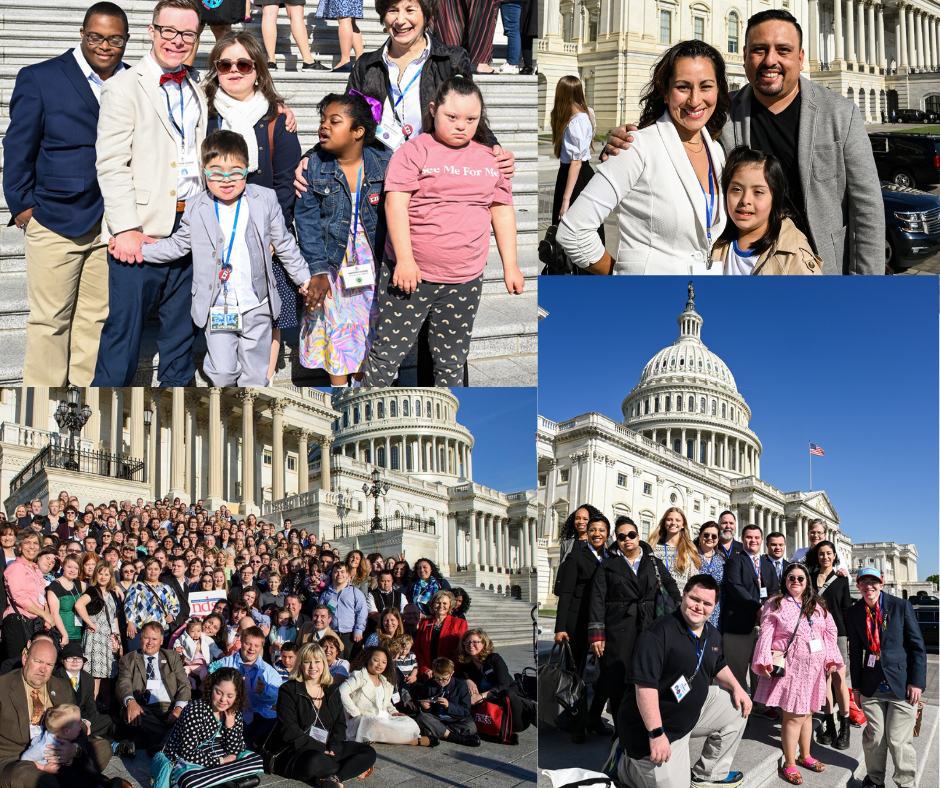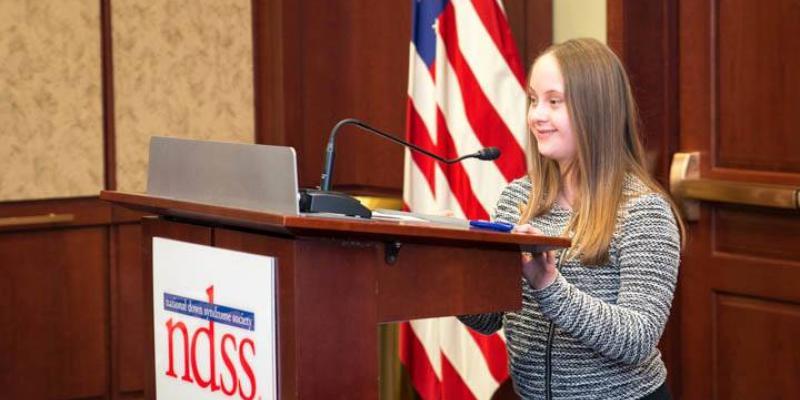
The NDSS Advocacy and Policy Program champions federal, state, and local policies that positively impact all people with Down syndrome across the country. Through our advocacy, NDSS works with Congress and federal agencies, as well as state and local officials, to develop and improve laws, regulations, and policies for the benefit of the Down syndrome community. NDSS also empowers self-advocates, families, and others to influence policy themselves. View our policy priorities by topic below or click to jump to your topic of interest to the right.
Congressional task force
Congressional Task Force on Down Syndrome
In support of all our legislative priorities, NDSS champions the Congressional Task Force on Down Syndrome, a bipartisan, bicameral group of legislators committed to educating Members of Congress and their staff about Down syndrome and advancing legislative priorities that positively affect the Down syndrome community. NDSS is proud to collaborate with the Global Down Syndrome Foundation and the National Down Syndrome Congress (NDSC) in jointly supporting the work of the Task Force.
The 119th Congress task force is still in formation. Please check back soon for updates on task force leadership, membership, and opportunities to invite your Members of Congress to join!
118th Congress Co-Chairs
Congresswoman Cathy McMorris Rodgers (R – WA) Senator Bob Casey (D – PA)
Congresswoman Eleanor Holmes Norton (D – DC) Senator Jerry Moran (R – KS)
118th Congress Membership
Congressman Barry Moore (R – AL) Senator Roger Marshall (R – KS)
Congressman Pete Sessions (R – TX) Senator John Boozman (R – AR)
Congresswoman Sharice Davids (D – KS) Senator James Risch (R – ID)
Congresswoman Nikki Budzinski (D – IL) Senator Shelley Moore Capito (R – WV)
Congressman Anthony D’Esposito (R – NY) Senator Raphael Warnock (D – GA)
Congressman Jake Auchincloss (D – MA) Senator Jon Ossof (D - GA
Congressman John Rutherford (R – FL)
Congressman Alex Mooney (R – WV)
Congressman Jake LaTurner (R – KS)
Congressman Andrew Garbarino (R – NY)
Health
Protecting Access to Medicaid
Use our toolkit below to learn more about this issue and how to take action!
Medicaid is a government program that provides free or low-cost health insurance to eligible individuals, including individuals with Down syndrome. It covers essential medical services like doctor visits, hospital stays, and prescriptions. It is also the only payer of Home and Community-Based Services (HCBS) and can be used to cover necessary therapies and interventions provided in a school setting for students with disabilities, such as speech therapy, occupational therapy, and more.
Medicaid is a critical lifeline to the vast majority of individuals with Down syndrome and their families. According to a 2023 report from Boston University, Medicaid is the primary insurance for the majority of individuals with Down syndrome.
NDSS supports protecting, strengthening, and expanding Medicaid so that it can better serve individuals with Down syndrome and the broader disability community. We oppose any attempts to weaken Medicaid or impose additional barriers to coverage and service delivery.
Health
Organ Transplant Discrimination Prevention
Use our toolkit below to learn more about this issue and how to take action!
Organ Transplant Discrimination Toolkit
NDSS supports the Charlotte Woodward Organ Transplant Discrimination Prevention Act (H.R. 1520). The bill is named after Charlotte Woodward, an advocate with Down syndrome and member of the NDSS staff who received a life-saving heart transplant a decade ago. Since then, she has advocated tirelessly to ensure others with Down syndrome and other disabilities have the same access to life-saving care that she did. NDSS supports this legislation because it would prevent discrimination based solely on disability in the organ transplantation process and provides additional legal recourse to people with Down syndrome and other disabilities should they experience discrimination.
Until a federal law is passed, NDSS will continue to work to protect people with disabilities from discrimination in organ transplantation at the state level. Currently, 40 states have laws in place that prohibit this discrimination:
- Alabama(2023)
- Arizona (2022)
- Arkansas (2021)
- California (1996)
- Colorado (2021)
- Delaware (2017)
- Florida (2020)
- Georgia (2021)
- Illinois (2021)
- Indiana (2019)
- Iowa (2020)
- Kansas (2018)
- Kentucky (2023)
- Louisiana (2019)
- Maryland (2015)
- Massachusetts (2016)
- Michigan (2022)
- Minnesota (2021)
- Mississippi (2022)
- Missouri (2020)
- Montana (2021)
- Nevada (2021)
- New Jersey (2013)
- New Mexico (2023)
- North Carolina (2021)
- North Dakota (2023)
- Ohio (2018)
- Oklahoma (2021)
- Oregon (2017)
- Pennsylvania (2018)
- Rhode Island (2021)
- South Carolina (2022)
- South Dakota (2022)
- Tennessee (2021)
- Texas (2021)
- Virginia (2020)
- Washington (2019)
- West Virginia (2022)
- Wisconsin (2021)
- Wyoming (2021)
Health
Alzheimer’s Disease
Use our toolkit below to learn more about this issue and how to take action!
NDSS supports legislation and regulatory action that includes people with Down syndrome in efforts to research, cure, and treat Alzheimer’s disease. People with Down syndrome are uniquely situated in the Alzheimer’s landscape because they have an extra copy of chromosome 21. The 21st chromosome carries the amyloid precursor protein (APP) gene, which is strongly associated with the formation of amyloid peptides and plaques, a hallmark of Alzheimer’s disease. As a result, individuals with Down syndrome have an elevated lifetime risk of developing Alzheimer’s disease, with the onset of symptoms coming earlier and progressing faster than in the general population.
NDSS calls on Congress to improve supports for the Down syndrome community related to Alzheimer’s disease, encompassing supports for patients with Down syndrome, their caregivers, and the healthcare providers upon whom they rely for diagnosis and treatment. Additionally, NDSS supports coverage determinations that ensure access to and coverage of safe and effective Alzheimer’s treatments.
Health
Prohibition of the Use of QALYs and Similar Discriminatory Metrics
Quality Adjusted Life Years (QALYs) and similar metrics exist to measure the value of health outcomes by placing a numerical value on the quality of one’s life before and after healthcare treatments and interventions. People with disabilities are frequently assigned a lower QALY value. These measurements are regularly used by federal programs, such as Medicaid, to determine the cost-effectiveness of treatments and services, and thus coverage for patients. Since a substantial number of individuals with disabilities receive their health care through Medicaid, this flawed and discriminatory metric directly impacts access to necessary, and at times critical, healthcare treatments when they are not deemed “cost-effective” enough to administer to individuals with disabilities.
NDSS supports legislation, H.R. 485, the Protecting Health Care for All Patients Act, which would prohibit the utilization of QALYs and similar metrics in federal health programs. In February 2023, NDSS President and CEO, Kandi Pickard, testified in support of the bill to the United States House of Representatives Committee on Energy and Commerce, Subcommittee on Health. NDSS calls on Congress to pass H.R. 485 and end this discrimination.
Health
Prenatal & Postnatal Information
NDSS is a pro-information organization, and one of our key legislative priorities is ensuring that all women and families across the country receive the most accurate, up-to-date, evidence-based information available about Down syndrome when receiving a prenatal or postnatal diagnosis.
The Prenatally & Postnatally Diagnosed Condition Act (Public Law 110-374) was enacted into federal law in 2008 to increase the readiness of accurate, up-to-date, and balanced information about Down syndrome to women and families considering prenatal testing. The federal law was not funded, and, in the absence of funding, advocates have taken up the issue with their state legislatures.
NDSS supports state pro-information laws that ensure health care providers disseminate accurate and up-to-date information to anyone receiving a diagnosis of Down syndrome. The following states have passed Down syndrome information bills:
- Delaware(2014)
- Florida (includes Down syndrome and other developmental disabilities) (2018)
- Idaho (2022)
- Illinois (2016)
- Indiana (2015)
- Kentucky (2015)
- Louisiana (2014)
- Maine (2015)
- Maryland (2014)
- Massachusetts (2012)
- Minnesota* (includes Down syndrome and other trisomy conditions) (2015)
- Mississippi (2021)
- Missouri (2007)
- Nebraska (2016)
- Nevada (2023)
- New Jersey (2016)
- Ohio (2015)
- Oklahoma (2022)
- Pennsylvania (2013)
- Tennessee (2018)
- Texas (2015)
- Utah (2019)
- Washington (2016)
Employment & economic self-sufficiency
Achieving a Better Life Experience (ABLE) Accounts
Use our toolkit below to learn more about this issue and how to take action!
In the 119th Congress, the Ensuring Nationwide Access to a Better Life Experience (ENABLE) Act (S. 627/H.R. 1436) is a top priority for NDSS. If passed, the ENABLE Act would make three critical provisions of ABLE accounts permanent.
ABLE Accounts were created after the passage of The Stephen Beck, Jr. Achieving a Better Life Experience (ABLE) Act (Division B of PL 113- 295). They are an investment account similar to a 401(k) or a 529 college savings account. NDSS has been a leader in ABLE education and advocacy since the original passage of the bill.
Employment & economic self-sufficiency
Subminimum Wage
Use our toolkit below to learn more about this issue and how to take action!
Ending Subminimum Wage Toolkit
Despite existing civil rights protections, thousands of Americans with disabilities are legally paid less than the minimum wage because of a provision in Section 14(c) of the Fair Labor Standards Act of 1938. This provision has led to the segregation of people with disabilities into sheltered workshops and has perpetuated the myth that people with disabilities are incapable of meaningful employment. NDSS supports the Transformation to Competitive Integrated Employment Act which would phase out 14(c) certificates and help transition people with disabilities into competitive, integrated employment.
NDSS is working at the state level to pass bills to phase out the payment of subminimum wages under Section 14(c). States that have taken steps to guarantee a minimum wage to workers with disabilities include:
- Alaska (2018)
- Arizona (2024)
- California (2021)
- Colorado (2021)
- Connecticut (2024)
- Delaware (2021)
- Hawaii (2021)
- Kansas (2024)
- Illinois (2021) *new bill to be introduced
- Maine (2020)
- Maryland (2016)
- Massachusetts (2024)
- Minnesota (2021)
- Nevada (2023)
- New Hampshire (2015)
- New Jersey (2024)
- Oregon (2019)
- Reno, NV (2019)
- Rhode Island (2022)
- South Carolina (2022)
- Tennessee (2022)
- Texas (2019) **this legislation eliminates subminimum wage in only certain circumstances
- Vermont (2002)
- Virginia (2023)
- Washington (2021)
Employment & economic self-sufficiency
Increased Asset Limitations and Elimination of the Marriage Penalty
Use our toolkit below to learn more about this issue and how to take action!
NDSS supports the SSI Savings Penalty Elimination Act which would increase the allowable assets individuals with disabilities may possess while remaining eligible for government benefits and eliminate the marriage penalty. Currently, individuals cannot have more than $2,000 in assets without affecting their eligibility for critical government benefits. For married couples who are both SSI eligible, this limit is $3,000 combined. As a result, most individuals with IDD cannot marry without fear of losing their critical benefits. These limitations have not been changed in many years and have not increased to account for inflation or other economic factors. NDSS advocates for both increased asset limitations and elimination of the marriage penalty so that individuals with Down syndrome and other disabilities can work, save, and marry who they choose.
Education
Increased funding for the Individuals with Disabilities Education Act (IDEA)
The Individuals with Disabilities Education Act (IDEA) (Public Law 101-476) makes available a free and appropriate public education to students with disabilities that fits their individual needs. Despite the federal government’s promise to pay 40% of the extra cost of educating students under the IDEA, estimates show that the federal government covers only 14.6% of the cost. NDSS supports fully funding the IDEA at the level promised by the federal government because it would significantly increase the quality and quantity of education and related services made available to students with Down syndrome and other disabilities.
Education
Restraint and Seclusion
NDSS supports legislation that prohibits schools that receive federal funding from secluding or physically, mechanically, or chemically restraining students except when absolutely necessary in order to protect the safety of students and staff. Additionally, we support better equipping school personnel with the training they need to effectively implement evidence-based and proactive behavior intervention strategies. Harmful seclusion and restraint practices are disproportionately used on students with disabilities. We believe that students with disabilities deserve to be treated with dignity and respect and should be protected from the risk of traumatic, dangerous, and dehumanizing procedures as a means of managing challenging behavior in school.
Education
Protecting Access to Special Education Programs in the Department of Education
Department of Education Advocacy Toolkit
The Department of Education is a federal agency that supports state and local education agencies by promoting access to quality education for all students. The Department of Education is responsible for enforcing and implementing federal education programs, like the Individuals with Disabilities Education Act (IDEA), which guarantees a free appropriate public education (FAPE) to qualified students with disabilities.
The United States Department of Education plays a critical role in safeguarding the provision and oversight of special education services to millions of students with Down syndrome and other disabilities. The Department of Education and its staff have the necessary knowledge and experience to ensure students with disabilities have access to specialized instruction, accommodations, and relevant services in schools.
NDSS opposes any efforts to abolish or otherwise undermine the Department of Education and its work to provide a free appropriate public education free from discrimination to students with Down syndrome and other disabilities.







